Ten Minutes Older: The Trumpet (Aki Kaurismaki, Victor
Erice, Werner Herzog, Jim Jarmusch, Wim Wenders, Spike Lee, & Chen Kaige,
2002)
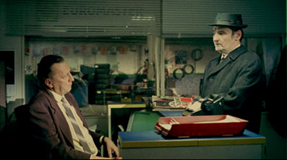 The portmanteau film is one of the less
impressive genres in cinema, but Ten
Minutes Older: The Trumpet, unlike its companion film The
Cello (really only noteworthy for Godardís entry), is a respectable
collection of shorts. With an impressive list of participating directors
involved, the films all are use time as a theme and run ten minutes long each.
Obviously, some of them are better than others, but none of them are
excruciating, which makes the prospect of digging for the riches within The
Trumpet less daunting than usual. A film-by-film breakdown follows:
The portmanteau film is one of the less
impressive genres in cinema, but Ten
Minutes Older: The Trumpet, unlike its companion film The
Cello (really only noteworthy for Godardís entry), is a respectable
collection of shorts. With an impressive list of participating directors
involved, the films all are use time as a theme and run ten minutes long each.
Obviously, some of them are better than others, but none of them are
excruciating, which makes the prospect of digging for the riches within The
Trumpet less daunting than usual. A film-by-film breakdown follows:
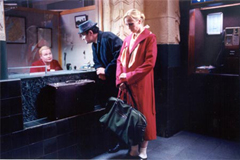 Aki Kaurismškiís entry, Dogs
Have No Hell [36], which features the two leads from his most recent film,
seems on the surface on par with his usual output, but it doesn't work precisely
because of its abbreviated duration. In this pulpy comic drama, Markku Peltola
plays a man who gets out of prison and has ten minutes to get money, get his
girl, get married and catch a train to Moscow. Because the ten minute time limit
forces him to speed up his pace, Kaurismški has to abandon his usual plodding
drollery. The retro rock and roll number is now pressed up more tightly against
the symphonic overtures, and the character quirks that usually inspire laughter
don't have time to register because the clock is always ticking.
Aki Kaurismškiís entry, Dogs
Have No Hell [36], which features the two leads from his most recent film,
seems on the surface on par with his usual output, but it doesn't work precisely
because of its abbreviated duration. In this pulpy comic drama, Markku Peltola
plays a man who gets out of prison and has ten minutes to get money, get his
girl, get married and catch a train to Moscow. Because the ten minute time limit
forces him to speed up his pace, Kaurismški has to abandon his usual plodding
drollery. The retro rock and roll number is now pressed up more tightly against
the symphonic overtures, and the character quirks that usually inspire laughter
don't have time to register because the clock is always ticking.
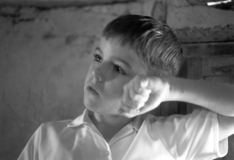 Victor Ericeís Lifeline
[57] is a refined, subdued and gorgeous black and white study in cinematography.
Though it's from the outset, the story of an injured baby (and the loss of
innocence), it spends several minutes establishing mood before becoming too
overtly symbolic. It captures the feel for life in a Spanish small town, or at
least an idealized black-and-white dream of that feel, and then punctures that
feeling with a slowly building rhythm of portentous symbols (e.g. a snake
crawling amongst apples, a black cat). It's a beautiful experience, but a
simplistic one that only gains any emotional power with the associations that
its final shot inspire. At least one can say that it works better as a short
than it would as a feature.
Victor Ericeís Lifeline
[57] is a refined, subdued and gorgeous black and white study in cinematography.
Though it's from the outset, the story of an injured baby (and the loss of
innocence), it spends several minutes establishing mood before becoming too
overtly symbolic. It captures the feel for life in a Spanish small town, or at
least an idealized black-and-white dream of that feel, and then punctures that
feeling with a slowly building rhythm of portentous symbols (e.g. a snake
crawling amongst apples, a black cat). It's a beautiful experience, but a
simplistic one that only gains any emotional power with the associations that
its final shot inspire. At least one can say that it works better as a short
than it would as a feature.
 The third short, Werner Herzogís Ten Thousand Years Older [69], is a fascinating mini-documentary
which examines the discovery of what might perhaps be the last lost tribe. Set
in the Amazon, the film epitomizes Herzogís willingness to go to the ends of
the earth to demonstrate his attitudes about civilizationís debilitating
effects on nature. Genuine tension arises in scenes such as the one showing the
tribeís first contact with modern man, in which a native threatens to spy the
hidden camera recording the event. When Herzog tells us that these few minutes
of contact with the modern world led to the tribeís demise, the film suddenly
shifts into a sadder, but no less interesting mode. Time jumps forward twenty
years, and the effects of the modern world are made apparent. Even if it's not
one Herzogís best works, it's undeniably an excellent piece of moviemaking.
The third short, Werner Herzogís Ten Thousand Years Older [69], is a fascinating mini-documentary
which examines the discovery of what might perhaps be the last lost tribe. Set
in the Amazon, the film epitomizes Herzogís willingness to go to the ends of
the earth to demonstrate his attitudes about civilizationís debilitating
effects on nature. Genuine tension arises in scenes such as the one showing the
tribeís first contact with modern man, in which a native threatens to spy the
hidden camera recording the event. When Herzog tells us that these few minutes
of contact with the modern world led to the tribeís demise, the film suddenly
shifts into a sadder, but no less interesting mode. Time jumps forward twenty
years, and the effects of the modern world are made apparent. Even if it's not
one Herzogís best works, it's undeniably an excellent piece of moviemaking.
 Jim Jarmuschís Int.Trailer.Night
[76], however, just might be one of its makerís finest achievements.
Taking place in real time, and starring Chloe Sevingy, the short goes a long way
toward deglamorizing the myth of the celebrity trailer. Very little of import
happens, beyond the visits a series of technicians make and a cell phone call
that the actress places, but it manages to create a credible portrait of the
actressí role in a production. At once a tool of the film and a personality
who must be catered to above the needs of the film, she exists in a rarefied,
but lonely, zone. The use of real time drives home the tedium inherent in a
filmís shooting schedule. The respect and personal space that sheís given
lead to loneliness, even as sheís being physically violated by a hair stylist
and a sound man. Itís not a deep movie, by any means, but itís perfectly
pitched and surprisingly succinct in the way it goes about making its
observations.
Jim Jarmuschís Int.Trailer.Night
[76], however, just might be one of its makerís finest achievements.
Taking place in real time, and starring Chloe Sevingy, the short goes a long way
toward deglamorizing the myth of the celebrity trailer. Very little of import
happens, beyond the visits a series of technicians make and a cell phone call
that the actress places, but it manages to create a credible portrait of the
actressí role in a production. At once a tool of the film and a personality
who must be catered to above the needs of the film, she exists in a rarefied,
but lonely, zone. The use of real time drives home the tedium inherent in a
filmís shooting schedule. The respect and personal space that sheís given
lead to loneliness, even as sheís being physically violated by a hair stylist
and a sound man. Itís not a deep movie, by any means, but itís perfectly
pitched and surprisingly succinct in the way it goes about making its
observations.
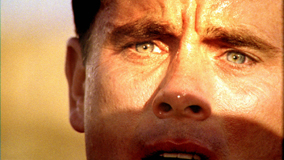 Twelve Miles to Trona [40], by Wim Wenders, is probably the least ambitious
of the shorts. In it, a desperate man (Charles Esten) speeds to a clinic to seek
treatment for an overdose of drugs. Trick lenses distort the American landscape
as the man drives, resulting in a spectacular and surreal display of
pyrotechnics, underscored by music from the Eels. Itís technically adept and
capable of holding oneís attention, but awfully vapid. One canít help but
feel that its attempts to make a larger statement about the American experience
are in vain.
Twelve Miles to Trona [40], by Wim Wenders, is probably the least ambitious
of the shorts. In it, a desperate man (Charles Esten) speeds to a clinic to seek
treatment for an overdose of drugs. Trick lenses distort the American landscape
as the man drives, resulting in a spectacular and surreal display of
pyrotechnics, underscored by music from the Eels. Itís technically adept and
capable of holding oneís attention, but awfully vapid. One canít help but
feel that its attempts to make a larger statement about the American experience
are in vain.
 Spike Leeís politically charged We Wuz Robbed [43] rapidly examines the Democratic reaction to the
controversial 2000 Presidential election. Edited with amazing precision, itís
a piece of propaganda that inspires admiration regardless of your political
stance. Leeís examination of those who interceded with Goreís concession to
Bush makes the action seem unabashedly heroic, and, as the title suggests,
thereís no gray area in this movie about what should have been the
electionís proper outcome. It results in a movie thatís an electrifying
experience while viewing it, but also one thatís in no way convincing.
Spike Leeís politically charged We Wuz Robbed [43] rapidly examines the Democratic reaction to the
controversial 2000 Presidential election. Edited with amazing precision, itís
a piece of propaganda that inspires admiration regardless of your political
stance. Leeís examination of those who interceded with Goreís concession to
Bush makes the action seem unabashedly heroic, and, as the title suggests,
thereís no gray area in this movie about what should have been the
electionís proper outcome. It results in a movie thatís an electrifying
experience while viewing it, but also one thatís in no way convincing.
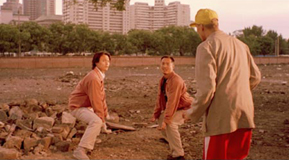 Finally, Chen Kaigeís limply conceived
100 Flowers Hidden Deep [30], is an insubstantial piece of whimsy
that seems odder by its inclusion alongside more serious fare. In it, a
delusional old man hires movers and leads them into a dilapidated old section of
Beijing. When they arrive, they find that there is no home to be moved, but they
humor him in an effort to receive payment. Ostensibly a piece about the loss of
things past, it comes off as mawkish.
Finally, Chen Kaigeís limply conceived
100 Flowers Hidden Deep [30], is an insubstantial piece of whimsy
that seems odder by its inclusion alongside more serious fare. In it, a
delusional old man hires movers and leads them into a dilapidated old section of
Beijing. When they arrive, they find that there is no home to be moved, but they
humor him in an effort to receive payment. Ostensibly a piece about the loss of
things past, it comes off as mawkish.
52
Jeremy Heilman
05-25-04